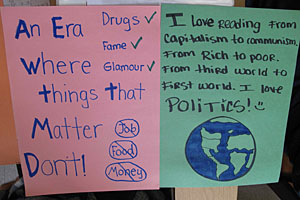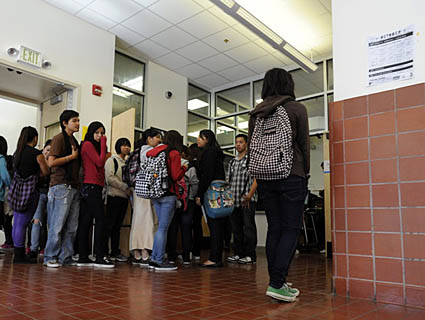
Photo: Kristina Rizga
It’s lunchtime at Mission High, and over homemade lamb dumplings a student has given him, teacher Amadis Velez and I are discussing the damning education documentary Waiting for Superman. Velez has never seen it. (Like most teachers I’ve talked to, he thinks WFS is an attack on teachers and refuses to pay to see it.) I’ve managed to talk Velez into watching a free press screener DVD of the film with his students and me as a classroom exercise, since the whole country seems embroiled in a bitter debate over how to “save” students from low-performing public schools without actually asking said students what they think about the achievement gap, charter schools, and teacher unions. The bell goes off, and Velez moves to the front of the class to begin a week of “Education and You” discussions in preparation for watching the movie.
“Today, we will be learning a new language,” Velez starts out. “It’s a language that I use, teachers use, media uses, Fox and CNN use. All of these adults are talking about you!” Velez says. Most of Velez’s students are immigrants, who went to very different schools in China, El Salvador, Russia, and Panama before they landed at Mission High. Some are undocumented, living under constant threat of deportation in exchange for the highly coveted US college diploma. Some want to become teachers.
“How many of you know what a charter school is?” Velez asks. I look around the class of 23 students, and Jakob* is the only one with his hand up. “OK, let’s back up, and talk about public and private schools for a minute,” Velez says.
“Did we always have public schools?” he asks. “Nooo!” the class responds in unison. Why is that? Velez asks. “Before only rich kids could go to schools,” a student at the front responds. “Why did they come up with public schools?” Velez asks. “So, everyone can have an education!” a student next to me responds, while many hands go up. “Could everyone get in right away?” Velez asks. “Noooo!” the class responds in unison, again. “Raise your hands, please,” Velez reminds students. “Who got in first, Eman?” Velez asks a student at the front. “Men,” she responds. “That’s right, and did every race got in right away?” “Noooo!” the class says in unison, again. “White people got in first,” a student next to me says.
“What do you think is a ‘charter school?'” Velez asks Jakob. “Something like a half-public, half-private school,” he responds. “Sort of,” Velez responds, and discusses the rise of the charter school movement in the US.
“What do you think is an ‘achievement gap?'” Velez probes next. Long silence. “Let’s break it apart: What do they mean by the word ‘achievement?” he asks. “Jobs, money, good college, dreams,” students shout out. “That’s right,” Velez says. “And what do they mean by a ‘gap?'” he asks. One hand goes up, “It means there is a difference,” a student next to me responds. “Exactly,” Velez says. “And what’s the connection?” he probes further. “It means we are not reaching our goals,” a student next to me says.
“Why do you think there is an achievement gap?” Velez asks. “Inequality!” one student responds, and Velez starts writing a list on the white dry-erase board. What else? he asks. The noise level rises as students throw out words: “Parents, giving up too soon, students not putting in enough effort, too much technology, too much entertainment, rules that create too many obstacles for immigrants, personality, too much work, Bush, culture, lack of counseling, my color.”
“Something is missing here!” Velez asks. “What’s missing?” No hands go up. “The box you are born into?” Jakob adds after a moment of silence. “What about teachers? What about your school? Shouldn’t we add Mr. Velez and Mr. Guthertz to this list?” Velez wonders. After a brief silence, one student raises her hand and responds with a slight accent, “Our school doesn’t give us that many problems.”
*All student names changed.
Editors’ Note: This education dispatch is part of an ongoing series reported from Mission High School, where education writer Kristina Rizga is embedded for the year. Previous dispatch: Meet the undocumented student who got a Harvard interview—but doesn’t want to go. Next dispatch: Mission High students react to “Waiting for Superman.” Plus: Sign up for our weekly newsletter to get all of the latest Mission High dispatches.

















